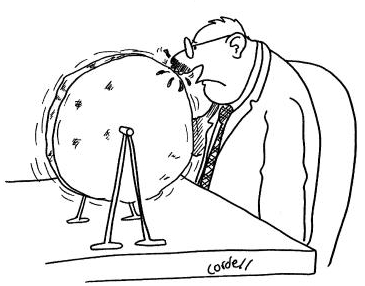In The Washington Post, Elsa Walsh takes issue with Sheryl Sandberg’s Lean In. Walsh thinks Sandburg’s tactics are pretty good instrumentally, but she’s a bit sickened by the kind of success Sandberg is using them for:
I have to wonder if Sandberg does not realize that she is going to die someday. There is so little life and pleasure in her book outside of work. Even sex is framed as something that men will get more of if they pitch in and help their working wives.
Success, particularly the kind Sandberg calls for, requires ever more time at the office, ever more travel. It requires always being available, always a click away. Sandberg is almost giddy when she describes getting up at 5 a.m. to answer e-mails before her children wake up and getting back on her computer once they are asleep.
“Facebook is available 24/7 and for the most part, so am I,” she writes. “The days when I even think of unplugging for a weekend or a vacation are long gone.”
Imagine what that life looks like to a child. Imagine what it looks like to yourself when you are 80.
I had similar concerns in an On the Square piece for First Things (“The Sad Secular Monks”):
Many of the most high-status jobs for the well-educated make a virtue of intensity and commitment. Investment banking boasts 80-hour work weeks; Teach for America’s emotional crucible results in a high burnout rate; and jobs in the political sector spawn articles like Anne-Marie Slaughter’s cri de coeur. Have a Type A personality? These jobs are ready to push you to (or past) your limit, and isn’t that what excellence is all about?
There’s a word for people who turn over their entire waking life to one cause, and willingly sacrifice the possibility of a family for the opportunity to serve: monks (or, more archaically, oblates). Just like the driven twenty-somethings of Rosin’s article, monks and nuns have made a commitment so total that it precludes marriage. But in the case of vowed religious, the form of their service is meant to be elevating, not just useful. I seldom hear people claim that spreadsheets are good for the soul. Even for people doing high intensity work for the public good (the teachers, the social workers, the public interest lawyers, etc.), the form of their work may still be deadening.
Most careers aren’t vocations, so we need space outside them to grow and love. It’s possible to make a short-term decision to put life and relationships on hold, in order to make a high-intensity commitment to a cause (this is the model for the oft-touted national service draft), but it’s unhealthy to let these crisis-mode jobs give shape to your life.
I realize that my concerns in the First Things essay and Walsh’s in WaPo are mostly framed in terms of the tradeoff between work and family, but the structure of high-intensity work sets up perverse incentives for those who choose not to have children or marriages, as well. If you’ll permit me to put on my Nisbet hat for a moment, the work-at-all times mentality makes it hard to have non-job related communities.
Someone who comes home exhausted in the late evening, or a person who is constantly on-call doesn’t have the temporal or emotional space to help out with community theatre or put up fliers in the apartment elevator for a book club or work on (or just attend!) a block party. And why should she? There’s no reason to expect that people working jobs similar to her will have the time to show up.
So, although you may carve out time for people you have an obvious obligation to (family and work), weak connections of friendship and proximity get neglected. With fewer non-job connections, you may experience evaporative cooling of beliefs (including the belief that this is a natural work schedule!). There’s less cross-talk to push your ideas and philosophy, less chance of correcting errors, and less chance of inspiration.
And less chance to practice loving the people who aren’t as easy or obvious for you to love — people you’re drawn to initially through the happenstance of storge instead of the similarity of phileo. That’s less chance to expand your understanding of the incredible diversity of the way Christ works through us and the surprising ways He might work in you.













